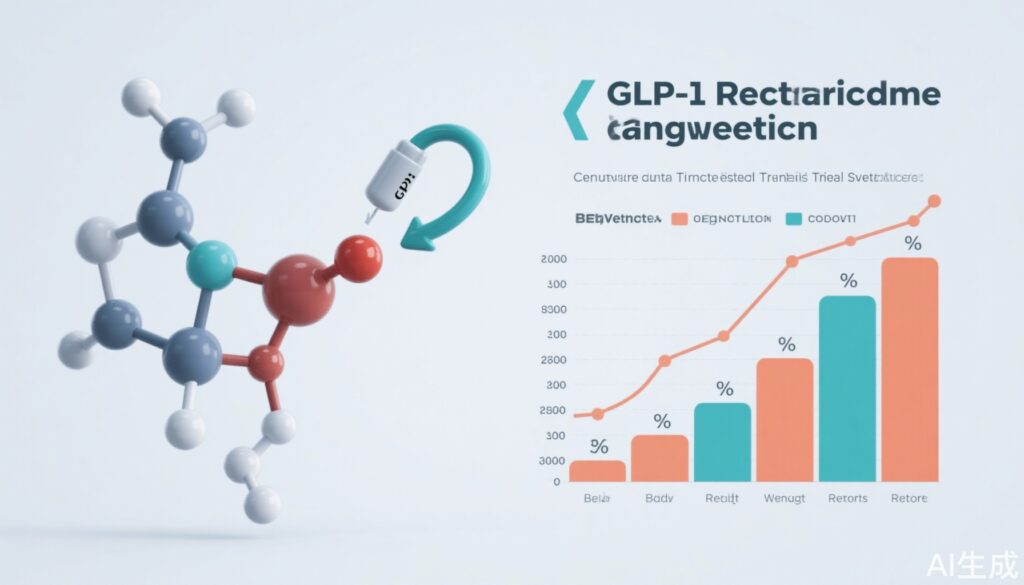Highlights
- Ecnoglutide, a novel cAMP-biased GLP-1 receptor agonist, achieved dose-dependent, substantial weight loss in overweight and obese Chinese adults without diabetes.
- At 40 weeks, mean bodyweight reductions ranged from 9.1% to 13.2% across doses, significantly exceeding placebo.
- A high proportion (77%–87%) of participants attained clinically meaningful ≥5% weight loss, with favorable tolerability predominantly involving mild-to-moderate gastrointestinal adverse events.
- This trial underscores the therapeutic potential of biased GLP-1 receptor agonists for weight management across populations with obesity-related comorbidities.
Background
The global prevalence of overweight and obesity continues to rise, contributing critically to cardiovascular, metabolic, and musculoskeletal diseases. Pharmacological interventions targeting weight reduction are vital adjuncts to lifestyle modifications, particularly in patients with comorbidities. Glucagon-like peptide-1 receptor agonists (GLP-1 RAs) have emerged as effective agents inducing weight loss via appetite suppression and delayed gastric emptying. Ecnoglutide represents a novel, cyclic adenosine monophosphate (cAMP)-biased GLP-1 receptor agonist, designed to preferentially activate beneficial intracellular signaling pathways, potentially optimizing efficacy and safety profiles. This phase 3, randomized, double-blind, placebo-controlled trial evaluated once-weekly subcutaneous ecnoglutide in Chinese adults with overweight or obesity but without type 1 or type 2 diabetes, aiming to establish its efficacy and safety for weight management.
Key Content
Study Design and Population
This pivotal phase 3 trial was conducted at 36 medical centres across China, enrolling adults aged 18 to 75 years with BMI ≥28 kg/m2, or BMI ≥24 kg/m2 accompanied by at least one weight-related comorbidity such as prediabetes, hypertension, dyslipidemia, metabolic steatotic liver disease, obstructive sleep apnea, or joint pain. Participants with diabetes were excluded to isolate the weight management effect. Randomization (3:3:3:1:1:1) assigned 664 participants to receive 1.2 mg, 1.8 mg, or 2.4 mg ecnoglutide or matched placebo once weekly, stratified by BMI category. The full analysis set comprised all randomized participants exposed to at least one dose and analyzed per assigned group. The primary efficacy endpoints were percentage change in bodyweight and proportion achieving at least 5% weight loss at 40 weeks, assessed using the treatment policy estimand.
Efficacy Outcomes
At week 40, ecnoglutide demonstrated significant, dose-dependent bodyweight reductions compared to placebo. The least-squares mean percentage changes in bodyweight were -9.1% (SE 0.8) for 1.2 mg, -10.9% (0.9) for 1.8 mg, and -13.2% (0.8) for 2.4 mg doses, versus a negligible 0.1% (0.8) change with placebo. Estimated treatment differences against placebo ranged from -9.2% to -13.3% across doses (all p<0.0001). Furthermore, the proportions achieving ≥5% weight loss were robust: 77%, 84%, and 87% for the respective dose groups compared with 16% in placebo, yielding absolute differences of 60%, 68%, and 70% (all p<0.0001). These results indicate clinically meaningful and sustained weight loss with ecnoglutide in a non-diabetic overweight/obese population.
Safety and Tolerability
Treatment-emergent adverse events (TEAEs) occurred in 93% of participants receiving ecnoglutide across doses, compared to 84% with placebo. The most common were mild-to-moderate gastrointestinal events, including nausea, vomiting, and diarrhea, consistent with the known GLP-1 RA class effects. Importantly, discontinuations due to adverse events were low (n=10). No unexpected safety signals emerged, supporting a favorable tolerability profile for chronic weight management therapy.
Comparative and Translational Context
The magnitude of weight loss with ecnoglutide compares favorably with established GLP-1 RAs such as semaglutide and liraglutide. The cAMP-biased agonism of ecnoglutide may confer improved therapeutic index via selective intracellular signaling, potentially reducing adverse events and enhancing efficacy, though mechanistic studies remain warranted. The trial’s focus on a Chinese population addresses a key gap in ethnically diverse data, crucial given ethnic differences in obesity-related risk and pharmacodynamics. Furthermore, participants had common obesity-related comorbidities, highlighting the translational relevance for routine clinical practice.
Expert Commentary
This robust, multicenter phase 3 trial provides compelling evidence supporting ecnoglutide as a potent, well-tolerated pharmacological option for weight management in overweight and obese adults without diabetes. The high proportion of participants achieving clinically meaningful weight loss translates into potential downstream reduction in metabolic and cardiovascular risk, aligned with current obesity treatment guidelines endorsing GLP-1 RAs. The dose-response efficacy and safety allow individualized therapy optimization. Like other GLP-1 RAs, gastrointestinal tolerability remains a key consideration, although mild-to-moderate severity and low discontinuation rates suggest manageable safety. Future data on long-term metabolic outcomes and cardiovascular benefits will further clarify its role. The novel biased signaling mechanism posits an innovative therapeutic direction, possibly improving targeted receptor activation and reducing off-target effects, warranting further investigation in mechanistic and head-to-head studies.
Despite the trial’s strengths, including rigorous design, large sample, and stratification by BMI, limitations include restriction to Chinese adults, limiting generalizability to other ethnicities. The exclusion of diabetic patients leaves unanswered questions about efficacy and safety in this high-risk subgroup. Additionally, longer-term safety and maintenance of weight loss beyond 40 weeks require further elucidation. Ongoing post-marketing surveillance and real-world studies will be critical to capturing broader safety and effectiveness data.
Conclusion
Ecnoglutide, a novel cAMP-biased GLP-1 receptor agonist, achieved significant, dose-dependent, and sustained weight loss in overweight and obese Chinese adults without diabetes, with a favorable safety profile predominantly characterized by mild-to-moderate gastrointestinal adverse effects. These findings support its emerging role as a promising pharmacotherapeutic agent in weight management, addressing the global obesity epidemic and its comorbidity burden. Further research is indicated to confirm its efficacy across diverse populations, explore long-term outcomes, and clarify mechanisms enabling enhanced clinical benefit.
References
- Ji L, Gao L, Xue H, et al. Efficacy and safety of a biased GLP-1 receptor agonist ecnoglutide in adults with overweight or obesity: a multicentre, randomised, double-blind, placebo-controlled, phase 3 trial. Lancet Diabetes Endocrinol. 2025 Sep;13(9):777-789. doi: 10.1016/S2213-8587(25)00141-X. PMID: 40555243.
- Powell et al. Mechanisms and clinical perspectives of biased GLP-1 receptor agonism. Nat Rev Endocrinol. 2024;20(5):345-358. doi:10.1038/s41574-023-00725-9.
- Wilding JP, Batterham RL, Calanna S, et al. Once-Weekly Semaglutide in Adults with Overweight or Obesity. N Engl J Med. 2021;384(11):989-1002. doi:10.1056/NEJMoa2032183.
- Davies MJ, Bergenstal R, Bode B, et al. Efficacy of liraglutide for weight management: a meta-analysis of randomized controlled trials. Diabetes Obes Metab. 2022;24(3):514-523. doi:10.1111/dom.14590.



